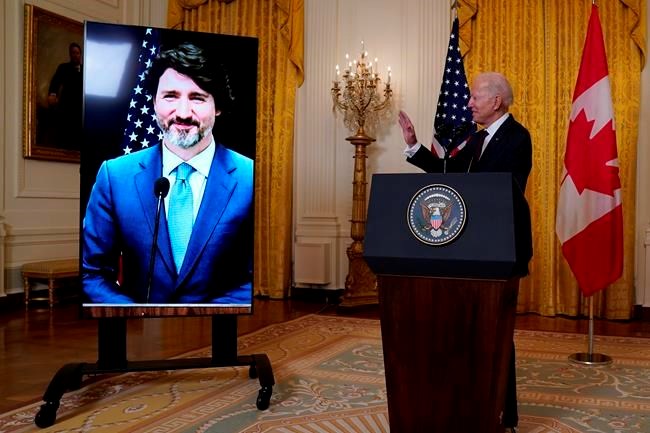CALGARY — New greenhouse gas emission cutting targets are being described as "extremely aggressive," "ambitious" and "illogical" by members of the Canadian oilpatch after they were rolled out at a virtual climate summit of world leaders on Thursday.
Prime Minister Justin Trudeau committed to slash Canada's GHGs by 40 to 45 per cent by 2030 and President Joe Biden vowed to cut emissions in the United States by 50 to 52 per cent in the same time frame.
"These are obviously extremely aggressive targets being laid out by leaders in Canada and the U.S. and I think there's absence of process or plan behind the targets. But you need to start with the targets, I understand that," said Kevin Neveu, CEO of Calgary-based Precision Drilling Corp., which operates in both Canada and south of the border.
"I think the objectives they are trying to achieve, we agree with and support," he added.
There are solutions available today such as using grid electricity, renewable energy or natural gas that would allow the drilling industry to meet the emission targets for its operations, said Neveu, adding he urges the governments to continue to support research that will allow the broader oilpatch to also cut emissions.
Grant Fagerheim, CEO of Whitecap Resources Inc., said he also supports efforts to reduce emissions but disagrees with the way the new Canadian targets are being rolled out.
"Having aspirational targets with no practical or scientific methodologies is illogical," he said.
"It seems like the federal government is working against the industry and not working with it. That's the frustration. There's no consultation. … We should be using science, not just political wherewithal to reduce (emissions)."
The Canadian industry is being compelled to cut methane emissions by 45 per cent by 2025 and is facing a rising tide of carbon taxes, he pointed out.
"We've reduced our direct emissions (at Whitecap) by over 30 per cent since 2017 but you don't get recognized for it," said Fagerheim.
"Where is the reward program, where is the incentivizing program? Versus the penalizing program?"
In an emailed statement, the CEO of the Canadian Association of Petroleum Producers defended his members' record in reducing emissions without directly commenting on the scale of the new emissions targets.
“Canada’s natural gas and oil industry has made emissions reduction a priority; not only setting goals, but showing how it can be done," said Tim McMillan.
"For example, in the oilsands industry, average GHGs per barrel have dropped 21 per cent since 2009 and, with current technologies under development, are projected to drop by an additional 20 to 27 per cent by 2030, demonstrating production growth can be compatible with emissions reductions."
The new targets are "ambitious" and achieving them will require all Canadians to co-operate and change the way they work, said Sneh Seetal, a spokeswoman for oilsands producer Suncor Energy Inc.
She added that the company is pleased with initiatives unveiled in the federal budget earlier this week to support and promote the use of carbon capture utilization and storage to offset GHG emissions.
"We’re encouraged by the political commitments coming out of today’s Leader’s Summit on Climate" said Jesse Semko, spokesman for pipeline company Enbridge Inc.
"Enbridge is committed to doing its part to reduce emissions and achieving our goal of net-zero greenhouse gas emissions by 2050."
The company is upgrading equipment and using solar self-power projects to meet its operational electricity requirements, while investing in renewables like offshore wind and emerging technologies such as hydrogen, renewable natural gas and carbon capture, utilization and storage, he said.
Spokesman Reg Curren declined to comment on the new targets on behalf of Cenovus Energy Inc. but said the oilsands producer remains committed to achieving net zero emissions by 2050 and will complete an analysis to set new near-term targets this year.
This report by The Canadian Press was first published April 22, 2021.
Companies in this story: (TSX:PD, TSX:SU, TSX:ENB, TSX:WCP, TSX:CVE)
Dan Healing, The Canadian Press




